My good friend Cynthia Shearer said something in a long-ago (long-ago in net years) blog post, a review of Richard Yates’ novel Revolutionary Road, that has puzzled me for a while. Before I get all critical of a single phrase in her post, lemme say some positive stuff to block any negative feelings.
- Her blog post’s awesome.
- Cynthia’s awesome and her blog’s awesome.
- Revolutionary Road and Richard Yates are awesome.
- Thanks to Cynthia’s review, Wifely and I both read the novel, and we found it so worthwhile, the book has since become something of a touchstone in some of our conversations.
Now with the kindnesses out of the way, here’s my quarrel, or really, quibble jumping-off point. In the course of otherwise spot-on praise for Yates’ novel, Cynthia gives the following as a thought on the book:
The novel is flawlessly structured, three acts, and eminently filmable.
Confirming what I thought, my OS X dictionary gives the following definition for “eminently”:
used to emphasize the presence of a positive quality
Maybe Cynthia wasn’t using the word so specifically, but regardless of authorial intent…and setting aside commerce, writers upping their audience — i.e., considering aesthetics alone — why is it a positive (or a negative) quality for a book to be filmable? We don’t say: “That’s a great sculpture; after all, it’d make a fantastic piece of photography” or “That’s a great painting; after all, it’d make an excellent symphonic work.”
Connections between artistic content remixed into another art form can be worth pursuing and elaborating and evaluating, but I don’t see any basis for using as a criterion of aesthetic appraisal the ease with which an artistic piece can be remixed to another art form.
By the way, one of my favorite remixes of artistic subjects is Rachmaninoff’s symphonic poem Isle of the Dead Op. 29, composed in the early 20th century and then recorded with Rachmaninoff himself conducting. And yes, it’s “beginner’s classical,” shut up. Arnold Böcklin’s painting Isle of the Dead inspired Rachmaninoff’s piece — apparently the black-and-white version:
Here’s the color version:
And the music, low-fi and split into two parts due to copyright and YouTube limitations:
And here’s an online encyclopedia of Isle of the Dead remixes.
Anyway, the (wrongheaded!) idea of using as a criterion of qualitative judgment an artwork’s capability to be transformed from one art form to another got me to thinking: what can a novel do that no other art form can do? The closest (non-textual) art forms are probably plays (in performance) and movies (“movies,” not “films”; I don’t screen films, I watch movies). What can novels do that those art forms can’t do? I’ll not consider plays, as I haven’t thought much about them. So: movies.
In my tentative answers I’m going to put aside style, too, since sentence-level quality, I think, is a) not obligatory for a novel to be good, and b) not inherently novelistic. So, my first tentative answer: maybe novels can represent time, the workings of memory, changing perspectives, and the inner experience of emotions and thoughts better than any other form. As an example of what I mean (UPDATE: screenhead.com’s list of the hardest novels to film), Theodore Sturgeon’s excellent short story The Man Who Lost the Sea (legal full text at link) — warning, spoiler in the third quoted paragraph:
Say you’re a kid, and one dark night you’re running along the cold sand with this helicopter in your hand, saying very fast witchy-witchy-witchy. You pass the sick man and he wants you to shove off with that thing. Maybe he thinks you’re too old to play with toys. So you squat next to him in the sand and tell him it isn’t a toy, it’s a model. You tell him look here, here’s something most people don’t know about helicopters. You take a blade of the rotor in your fingers and show him how it can move in the hub, up and down a little, back and forth a little, and twist a little, to change pitch. You start to tell him how this flexibility does away with the gyroscopic effect, but he won’t listen. He doesn’t want to think about flying, about helicopters, or about you, and he most especially does not want explanations about anything by anybody. Not now. Now, he wants to think about the sea. So you go away. […]
His head isn’t working right. But he knows clearly that it isn’t working right, which is a strange thing that happens to people in shock sometimes. Say you were that kid, you could say how it was, because once you woke up lying in the gym office in high school and asked what had happened. They explained how you tried something on the parallel bars and fell on your head. You understood exactly, though you couldn’t remember falling. Then a minute later you asked again what had happened and they told you. You understood it. And a minute later . . . forty-one times they told you, and you understood. It was just that no matter how many times they pushed it into your head, it wouldn’t stick there; but all the while you knew that your head would start working again in time. And in time it did. . . . Of course, if you were that kid, always explaining things to people and to yourself, you wouldn’t want to bother the sick man with it now. […]
Say you were that kid: say, instead, at last, that you are the sick man, for they are the same; surely then you can understand why of all things, even while shattered, shocked, sick with radiation calculated (leaving) radiation computed (arriving) and radiation past all bearing (lying in the wreckage of Delta) you would want to think of the sea. For no farmer who fingers the soil with love and knowledge, no poet who sings of it, artist, contractor, engineer, even child bursting into tears at the inexpressible beauty of a field of daffodils—none of these is as intimate with Earth as those who live on, live with, breathe and drift in its seas. So of these things you must think; with these you must dwell until you are less sick and more ready to face the truth.
(Oddly for a science fiction story originally published in a straight-up “genre” magazine — The Magazine of Fantasy & Science Fiction — “The Man Who Lost the Sea” was selected for the 1960 edition of The Best American Short Stories.)
I’m not sure a play or a movie could represent the Sturgeon story, its workings of time, memory, changing perspectives, and inner experience as well and as concisely — or even at all. But that’s a huge disjunction: are plays and movies able to represent the Sturgeon story — just not concisely or well — or is there something inherent to the story that cannot be translated to another art form? I think that depends on how inherent an aspect of an artwork has to be for it to be considered inherent. ;-) And, how good does the movie have to be? The movie could voice-over or crawl tons of text to get closer to the original fiction format, but that (probably) would become annoying. You never know, however; artists are always figuring out new techniques. All the same, because representing time, memory, changing perspectives, and inner experience is at least a huge strength of fiction (and especially the novel), more and more I try to emphasize those qualities in my own writing.
I said first tentative answer, so how about this second one, which I can describe best in a metaphorical way? Novels are like multicharacter, revised, organized daydreams — or, imagine being a kid and playing with dolls or figurines, making up stories. That’s basically what novels are, I think, but not so much created daydreams worlds as the daydream-y experience of personal identity as a network of multiple narratives, comprised of images, emotions, etc., and stuck into the context of particular settings and social histories/influences and so forth. Sorta sounds like Bakhtin’s account of polyphony in Dostoevsky. But I haven’t read enough Bakhtin yet to say much; besides, his name sounds like Bactine.
This way of looking at what’s unique to novelistic form doesn’t seem to strongly entail the memory rumination or time aspects or changing perspectives I mentioned earlier, but yeah, I think fiction — especially when it avoids too much exposition and abstraction — stages a vehicle for experiencing a daydream related to identity and traveling in a specific historical or social context. Yet in “When Narrative Fails,” an article in May 2004’s Philosophy, Psychiatry, & Psychology, J. Melvin Woody makes an interesting case that other forms of art can do this, too:
“Why […] should we limit our understanding of the constitution of the self to the narrative? Indeed, why limit ourselves to language? Do not music and dance often articulate our passions more eloquently than any literary form?”
Nevertheless I think my second answer is pretty strong, and pertinent to why reading fiction is not just another hobby or preference, but something people who have the ability and resources and time to read it really should do so.



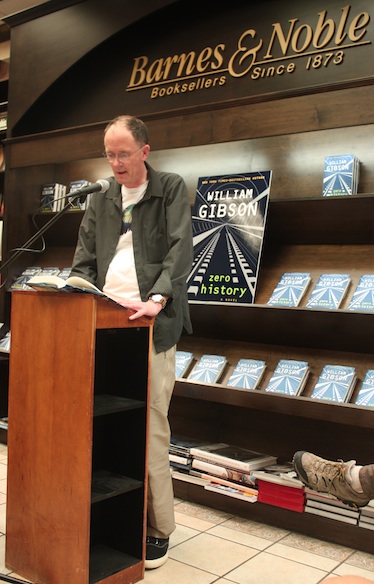
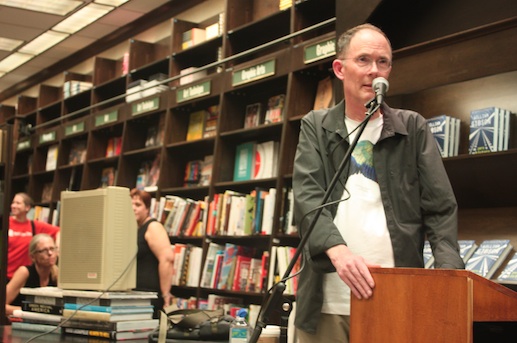
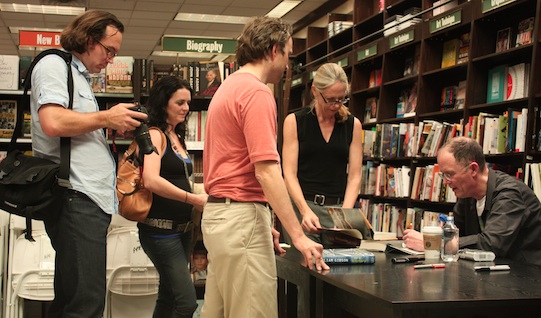

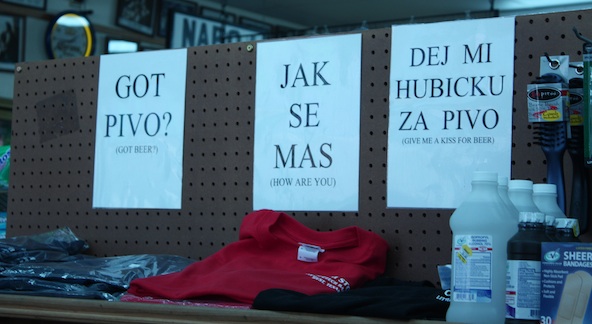
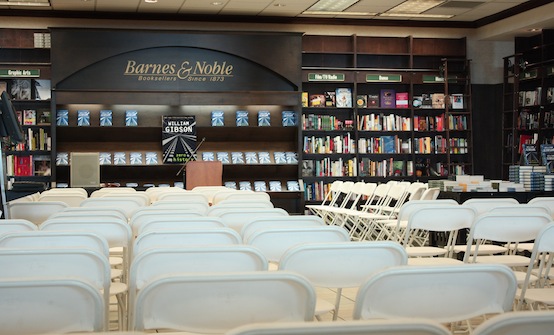
 Twitter:
Twitter:
Join the conversation